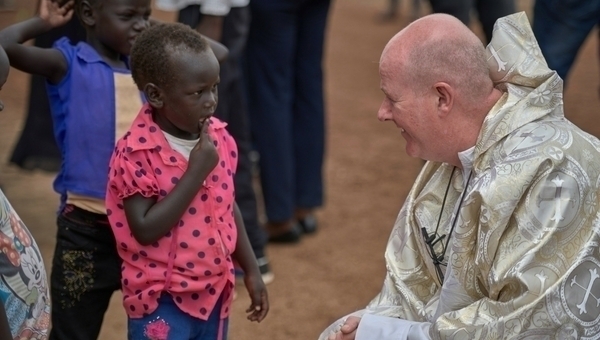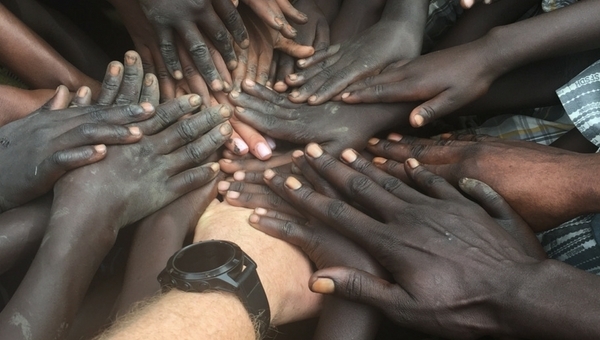
Tony O’Riordan SJ has been appointed as leader of the Jesuit Refugee Service (JRS) team in Maban, South Sudan. In an effort to share his experiences working with refugees and internally displaced people, he has created a personal webpage entitled ‘Spes Mundi’ (Latin for ‘Hope of the World’). He hopes through this platform to connect with his network of relations, friends, and ‘friends he has not yet met’, and to invite readers to provide practical help for the JRS project.
In his blog posts, Tony integrates his experience as a Jesuit priest in Ireland and abroad with his cross-cultural learning in South Sudan. For example, he recalls the many horses roaming free on the roads in Limerick where he formerly ministered. On a similar note, he sees plenty of pigs roaming freely amid the market in Maban, the roads, and the maze of tracks leading off the roads to the local settlements of homes. The presence of such animals is but one reminder for him that life near the refugee camp is lived close to nature.
Tony says: “So it was not a big surprise to me that on St Patrick’s Day morning that Pia, my colleague from Uruguay, came to me to tell me that one of our drivers returning from one of the four refugee camps we work in, had been involved in an incident. He had hit ‘the ear of a pig.’ Now the precise point of impact between the car and the pig is not something I ever found out. But the pig was dead! The police had taken the ear of the pig. The owner of the pig was due compensation – a total of 12,000 South Sudanese Pounds. It sounds a lot, but war, economic collapse and inflation have weakened the local currency. There are about 200 SSP to the US dollar – so the pig’s life was valued at about $60. As someone who grew up on a farm, I had sympathy for the pig owner.”

Regarding the teaching staff of the refugee camps who live in very simple accommodation, Tony remarks: “They get on cheerfully and professionally with their preparations for their new students. It is just one more example of the strengths of this culture – people manage with less – and though happiness is always a dangerous thing to be measuring, people here often seem more content than people I know who have all the benefits of western living. I think this is what Jesus was on about when he says ‘Give us today, our daily bread…’ Living in a society and a culture of accumulating things does not lead to happier people!”
Tony speaks of the challenges learning Arabic in which the sounds are totally foreign to him and the grammar is a real slog. However, he reports making slow progress: “At Sunday Mass I manage to lead most of the prayers in Arabic [Mass is also in the local language Maban and English]. To do this I sat down with local priest Fr Luke. He is a native of here, and is the only Mabanese Catholic priest in the world. I recorded him as he read the prayers and then I listened back to the recording. As I was playing back the recording of Fr Luke, I wrote down the sounds as I heard them in such a way that pronouncing what I wrote sounded like the prayers in Arabic. It works. Well in so far as I can judge from the volume of responses from the congregation. I am not sure how well I am pronouncing the words in Arabic, but they certainly know what this Kayaja (the local word for white person) priest was trying to say and where in the Mass they are.”
Tony is also able to turn to gratitude in the midst of misfortune. When his useful pocket knife fell into a deep pit known as a latrine which is used as a toilet, he reflected: “It was a thing I wished had not happened, but one of the many things that happen because we are not perfect! But there is also another way to look at it. I am fortunate to have access to a latrine. 80% of people in South Sudan do not have access to one. So I can smile at this little story knowing that I am blessed to have access to a latrine!”
You can follow Tony’s adventures on Spes Mundi.
Click here to read the original article on the Jesuits in Ireland website.

